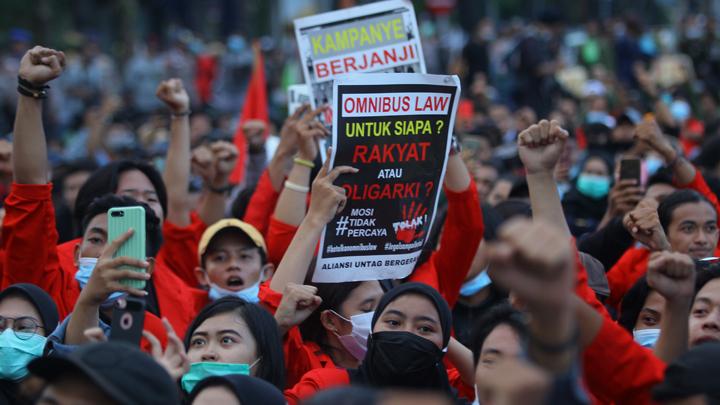
TEMPO.CO, Jakarta - Approved in a plenary session of the House of Representatives (DPR) on October 5, it is now in the hands of the president to be approved and ratified into law.
Much has been said about the negative impact of this law on the welfare of workers, the environment, the eradication of corruption and even the investment climate. Many people have shouted their protests about the flaws in the legislative process when the law was drawn up: it was done in secret, without involving the public, and was passed in a session that met the democratic procedural requirements but abandoned the substance of democracy itself. After the draft was typed, it turns out that the DPR then added and removed a number of articles, a clear violation of the law. And to add to the violations, outside the DPR building, demonstrators protesting against the law were beaten and detained.
It is true that the legislators and President Joko Widodo invited the protesters to examine the Job Creation Law in the Constitutional Court. In a formal legal sense, there is nothing wrong with this suggestion, although it means that they put the onus on the Constitutional Court. By producing a law that was so shoddy, the government and the DPR turned the Constitutional Court into nothing more than a trash can.
Furthermore, in the history of the Constitutional Court, it has never accepted objections from plaintiffs. In a study carried out by the Jentera School of Indonesian Law, from 2003 to 2019 the Constitutional Court did not grant a single request to revoke a law -- no matter how many processes of producing these laws were proved to have violated. The reasons given by the Court were that these laws in question benefited the majority. With the revision to the Constitutional Court Law raising the retirement age of Court judges, there is an even smaller chance that the Job Creation Law will be struck down. We all know that this revision was a sweetener that is bound to affect the independence of the Constitutional Court.
A number of governance experts have urged the president to issue a government regulation in lieu of law to revoke the Job Creation Law. There is a compelling argument for doing so: the chaotic way the legislative process was forced through in a rush. But it is impossible that this will go ahead -- since the outset, President Jokowi has given the green light. In other words, there is no hope of government regulation.
The original proposal for the omnibus law came from President Jokowi himself. The motive was a good one: to ease the way for investment by reducing the lengthy and complex permit procedure. However, in the process, deviations took place in the deliberations of the bill in Senayan: the rights of laborers were limited, environmental conservation was ignored, and corruption was encouraged.
It is difficult not to suspect that the president knew about and allowed these transgressions to go ahead. All that is left of the main idea behind the omnibus law to increase global investment and trigger the transformation of the Indonesian economy is good intentions. Instead of reducing regulations, the law will increase both their number and complexity. The government appeal for the public to oversee the establishment of regulations must now be seen as empty political talk because the drawing up of these regulations was not designed to be open to public criticism.
Things became even more confusing when the illiberal groups like the Save Indonesia Coalition (KAMI) and the 212 Alumni Brotherhood took advantage of the Job Creation Law protests for their own political short-term interests. Laborers, students, civil activists and others who care about the poor quality of legislation behind the Job Creation Law have now been forced to take a position on the one side or the other of the argument from the 2019 election: supporting or opposing Jokowi's leadership.
Both Jokowi and his opponents could benefit from this dichotomy. Jokowi's opponents hope to garner sympathy from the public's opposition to the Job Creation Law, while his supporters hope that those opposing the law will withdraw because of fears of being perceived as being on the same side as the illiberal mob.
Trapped in the dead-end alley, the public should not simply do nothing. There must be disobedience -- done well and politely. This is not an ideal measure, but in the words of a wise person, "If bad people pass poor laws, the duty of good people is to ignore them."
Read the Complete Story in Tempo English Magazine























